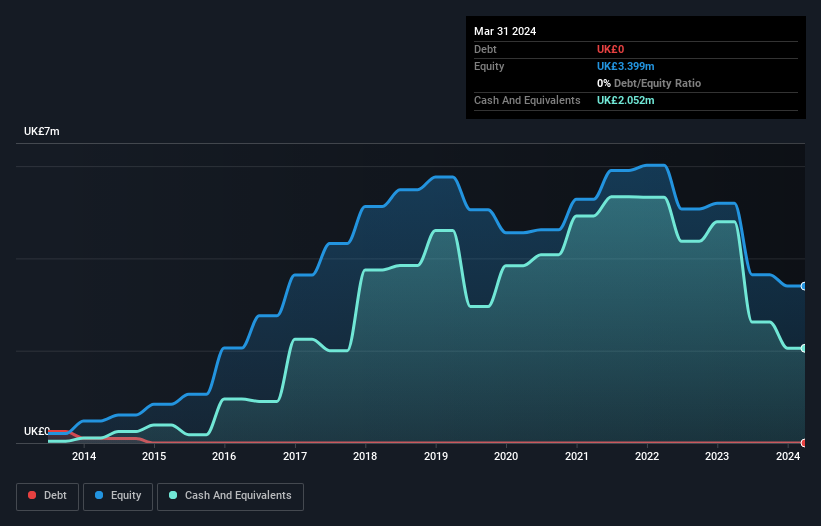There’s no doubt that money can be made by owning shares of unprofitable businesses. Indeed, Triad Group (LON:TRD) stock is up 110% in the last year, providing strong gains for shareholders. But while the successes are well known, investors should not ignore the very many unprofitable companies that simply burn through all their cash and collapse.
Given its strong share price performance, we think it’s worthwhile for Triad Group shareholders to consider whether its cash burn is concerning. In this article, we define cash burn as its annual (negative) free cash flow, which is the amount of money a company spends each year to fund its growth. We’ll start by comparing its cash burn with its cash reserves in order to calculate its cash runway.
View our latest analysis for Triad Group
When Might Triad Group Run Out Of Money?
A company’s cash runway is the amount of time it would take to burn through its cash reserves at its current cash burn rate. In March 2024, Triad Group had UK£2.1m in cash, and was debt-free. In the last year, its cash burn was UK£1.5m. Therefore, from March 2024 it had roughly 16 months of cash runway. That’s not too bad, but it’s fair to say the end of the cash runway is in sight, unless cash burn reduces drastically. You can see how its cash balance has changed over time in the image below.
Is Triad Group’s Revenue Growing?
We’re hesitant to extrapolate on the recent trend to assess its cash burn, because Triad Group actually had positive free cash flow last year, so operating revenue growth is probably our best bet to measure, right now. Regrettably, the company’s operating revenue moved in the wrong direction over the last twelve months, declining by 5.5%. Of course, we’ve only taken a quick look at the stock’s growth metrics, here. This graph of historic earnings and revenue shows how Triad Group is building its business over time.
How Hard Would It Be For Triad Group To Raise More Cash For Growth?
Given its problematic fall in revenue, Triad Group shareholders should consider how the company could fund its growth, if it turns out it needs more cash. Generally speaking, a listed business can raise new cash through issuing shares or taking on debt. One of the main advantages held by publicly listed companies is that they can sell shares to investors to raise cash and fund growth. By comparing a company’s annual cash burn to its total market capitalisation, we can estimate roughly how many shares it would have to issue in order to run the company for another year (at the same burn rate).
Triad Group has a market capitalisation of UK£52m and burnt through UK£1.5m last year, which is 2.9% of the company’s market value. So it could almost certainly just borrow a little to fund another year’s growth, or else easily raise the cash by issuing a few shares.
Is Triad Group’s Cash Burn A Worry?
Even though its falling revenue makes us a little nervous, we are compelled to mention that we thought Triad Group’s cash burn relative to its market cap was relatively promising. Cash burning companies are always on the riskier side of things, but after considering all of the factors discussed in this short piece, we’re not too worried about its rate of cash burn. Taking a deeper dive, we’ve spotted 3 warning signs for Triad Group you should be aware of, and 1 of them is a bit unpleasant.
Of course Triad Group may not be the best stock to buy. So you may wish to see this free collection of companies boasting high return on equity, or this list of stocks with high insider ownership.
Have feedback on this article? Concerned about the content? Get in touch with us directly. Alternatively, email editorial-team (at) simplywallst.com.
This article by Simply Wall St is general in nature. We provide commentary based on historical data and analyst forecasts only using an unbiased methodology and our articles are not intended to be financial advice. It does not constitute a recommendation to buy or sell any stock, and does not take account of your objectives, or your financial situation. We aim to bring you long-term focused analysis driven by fundamental data. Note that our analysis may not factor in the latest price-sensitive company announcements or qualitative material. Simply Wall St has no position in any stocks mentioned.
Have feedback on this article? Concerned about the content? Get in touch with us directly. Alternatively, email [email protected]

















